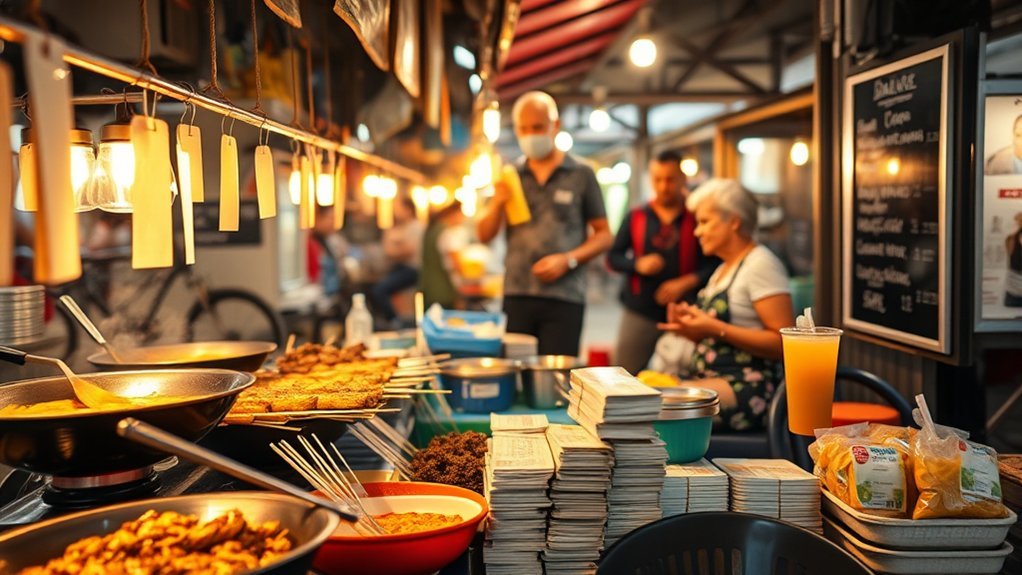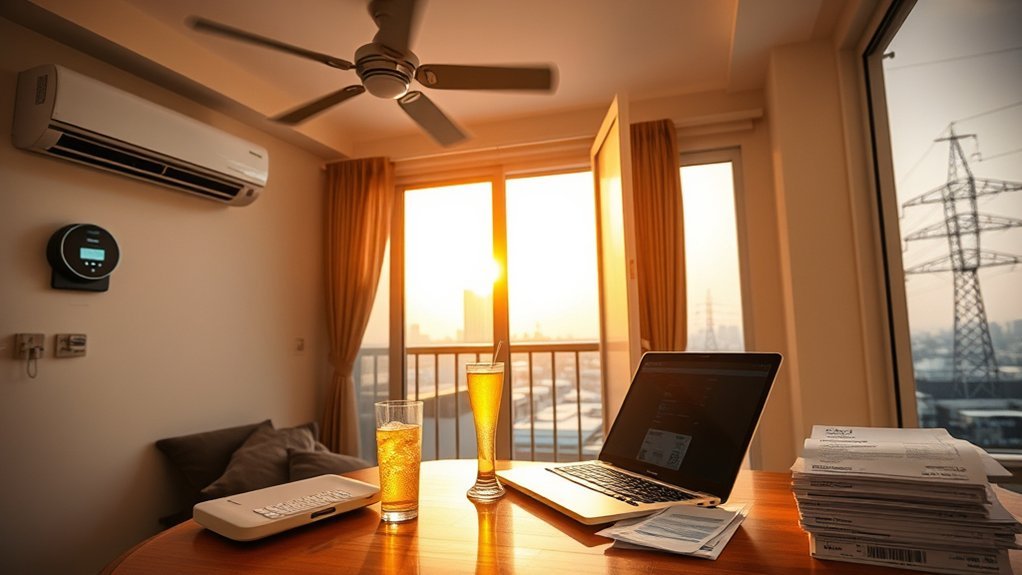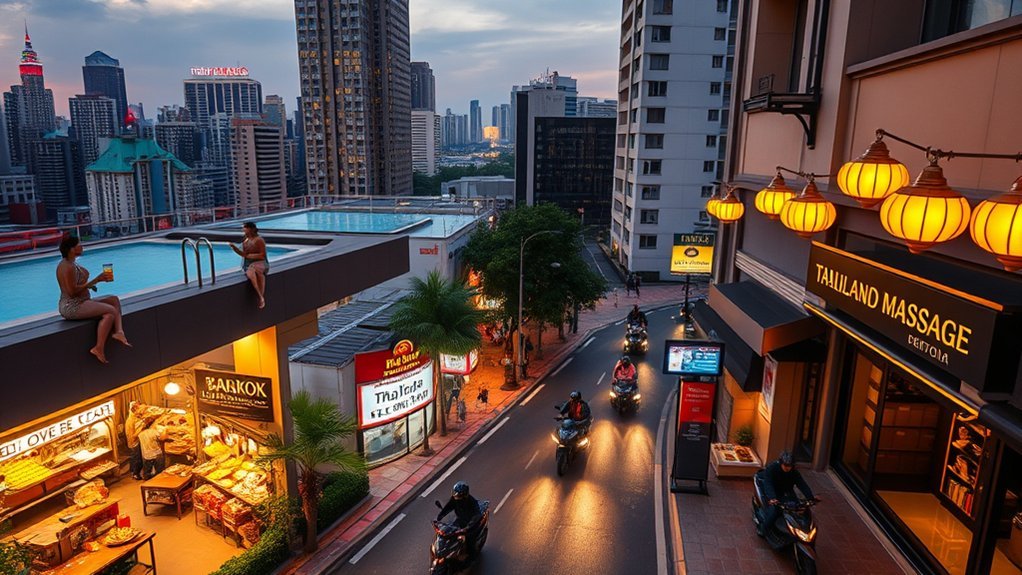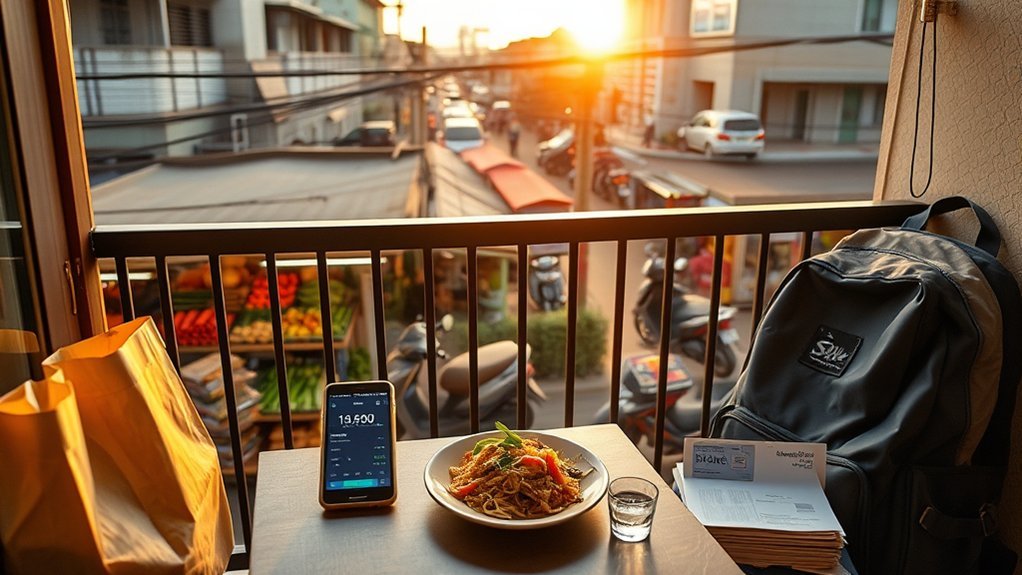You can live in Thailand on a wide range of budgets depending on location and lifestyle. Expect $600–1,200 monthly for basic living costs excluding rent; add $250–600 for one‑bedroom rentals outside major centers or $486–594 in Bangkok; luxury or family living pushes totals much higher. Street food and transit keep daily costs low, while private healthcare and international schools raise expenses. Keep exploring the breakdowns to plan a precise monthly budget.
Cost of Housing Across Cities

Housing costs in Thailand vary widely by city and neighborhood, so you can tailor your budget to lifestyle and location. You’ll find the cost of housing driven by demand: in Bangkok a one-bedroom apartment averages $250–$500 monthly, while prime city center rental prices sit around $486–$594. If you need more space, three-bedroom units in Bangkok’s city center can reach about $2,075.35, versus $964.68 outside the center. Chiang Mai gives you flexibility—city center one-bedroom apartment options run $230–$530, and outside the center you can secure places from $150. Koh Samui, as a tourist hotspot, typically posts one-bedroom rates of $462–$565 per month. Your monthly expenses drop further in smaller towns and rural areas, where rooms go under $50 and one-bedroom apartments start near $100. Use these figures to allocate rent within your budget, prioritize location over size if you seek freedom, and adjust other spending to sustain long-term mobility.
Food and Dining Expenses

You’ll find street food in Thailand can cost as little as $1 for breakfast or lunch, with popular dishes like Pad Thai typically around $3, making daily eats extremely budget-friendly. If you prefer sit-down meals, mid-range restaurants average $18–$60 for two while upscale resorts charge $15–$40 per person, so plan based on location and dining style. For groceries, expect 4,000–8,000 THB ($120–$240) monthly for one person, noting imported items (cheese ~$6.60/½ lb) are pricier than local produce and eggs (~$1.70/10-pack).
Street Food Prices
Because street food in Thailand keeps costs low, you can eat well for $1–$3 per meal without sacrificing flavor or variety. You’ll find street food prices that make affordable dining practical: Pad Thai or a noodle bowl for THB 50–70 (about $1.49–$2.06), spicy papaya salad near $1.70, and roti with banana and condensed milk around $2. Data-driven budgeting shows meals at inexpensive restaurants run $1.68–$2.06, while a rich Massaman curry at local restaurants is roughly $5. These figures reshape your cost of living projections and free up funds for travel or savings. Use street stalls to optimize daily food spend and taste authentic Thai food without breaking the bank.
- THB-priced staples: noodles, salads, roti
- Typical meal cost range
- Savings vs Western dining
Restaurant and Groceries
How much will you spend on food in Thailand? You can eat local meals and street food for $1–$3 per dish, with popular options like Pad Thai or curries roughly $1.70–$5, keeping food bills low. If you prefer dining at mid-range restaurants, expect $18–$60 for two, depending on location and cuisine. Grocery costs for one person typically run $120–$240 monthly; local markets supply fresh produce at very affordable prices, so you’ll save by buying seasonal items. Imported goods add cost—cheese about $6.60 per half pound, a dozen local eggs ~$1.70—so budget accordingly. Eating out suits daily life here: a vibrant dining culture offers freedom to choose affordable prices or occasional splurges.
Transportation and Getting Around

While living in Thailand, getting around is affordable and varied: public buses cost about $0.20–$0.85 per ride, BTS and MRT one-way fares run THB 16–59 ($0.50–$1.75), and monthly passes typically cost $27.66–$33.80 if you commute regularly. You’ll tap into a public transportation system that keeps transportation costs low for daily life and liberation-focused budgeting. Expect taxis in Thailand to start at a base fare near $1.01 daytime, plus about $1.45–$1.77 per mile; motorbike taxis begin around THB 20 ($0.60) for the first kilometer. If you need flexibility, scooter rental starts at THB 250 ($7)/day or THB 2,500 ($70)/month.
Getting around Thailand is cheap and varied—buses, BTS/MRT, taxis, motorbike taxis, or scooter rentals keep transport affordable and flexible.
- Choose public transportation for cheapest commutes and predictable monthly transportation passes.
- Use motorbike taxis for fast short hops; factor safety and negotiation.
- Rent a scooter for local freedom; compare insurance and fuel.
You’ll save most by combining public transportation with occasional taxis or scooter rental as a cost-effective, liberated commuter.
Healthcare and Insurance Costs

Curious how far your healthcare budget will stretch in Thailand? You’ll find the healthcare system surprisingly affordable and straightforward. GP visits at public hospitals run THB 30–200 (USD $1–6), while private hospitals charge THB 500–1,500 (USD $15–45). Health insurance in Thailand is highly recommended; good policies for expats find coverage at roughly USD $100–200/month, which protects you from large Healthcare Costs. Annual health check-ups at public hospitals can be as low as THB 720 (USD $21) for under-35s; private hospitals start around THB 5,400 (USD $160). Major surgeries show the gap clearly: a laparoscopic appendectomy may cost THB 213,000 (USD $6,300) privately vs THB 18,000–42,000 (USD $530–1,245) publicly. Dental care is affordable too—wisdom tooth extraction often falls between USD $87–200. If you value financial freedom, factor health insurance and routine checks into your cost of living calculations to avoid unexpected bills and preserve your independence.
Utilities, Internet, and Monthly Bills

You’ll typically pay THB 2,500–4,500 for combined utilities (electricity, water, gas, garbage) each month, with water around THB 200–300 and electricity spiking to THB 1,500–3,000 in hot months due to AC use. Unlimited home internet runs about THB 600–1,200 for 60+ Mbps, and mobile plans vary but can be budgeted alongside internet in the THB 3,000–5,000 total monthly range. Use these ranges to forecast and monitor bills so you can adjust usage or plan for peak-season electricity costs.
Typical Monthly Utilities
A realistic monthly utilities budget in Thailand for an average apartment runs roughly THB 2,500–4,500 (about $75–$135), covering electricity, water, gas, and garbage, with internet adding another THB 600–1,200 ($18–$35) depending on speed and provider. You’ll track typical monthly utilities and monthly utility costs to plan freedom-focused finances. Expected figures: a water bill of THB 200–300, electricity costs THB 1,500–3,000 for a one-bedroom, plus garbage and gas. Combined expenses and service providers determine your monthly expense based on usage.
- Prioritize lower-consumption habits to cut electricity costs and overall monthly expense.
- Compare service providers for internet services and bundled savings.
- Monitor water bill and gas usage to protect flexible budgets and mobility.
Internet and Mobile Plans
Alongside electricity and water, internet and mobile plans are a predictable monthly line item you should budget for when living in Thailand. Expect internet services with unlimited data at 60 Mbps+ to cost THB 600–1,200 per month; many urban areas offer high-speed fiber-optic connections that make remote work reliable. You’ll face a one-time installation fee of about THB 1,000–2,000 depending on provider and location. For mobile plans, prepaid options start near THB 300 for basic packages, while postpaid plans range THB 500–1,500 based on allowances and perks. Remember utilities for a standard apartment average THB 2,500–4,500 monthly; add internet and mobile to that total. Budget tightly, choose plans that free your time and money.
Entertainment, Leisure and Lifestyle Spending

Because entertainment in Thailand costs far less than in many Western countries, you can plan regular outings without blowing your budget: movie tickets typically run $4.82–$5.89, gym memberships about $38.17–$46.65/month, and meals at inexpensive restaurants only $1.68–$2.06, while a three-course dinner for two averages $19–$24. You’ll find entertainment costs consistently low, so you can prioritize experiences over possessions and live with more freedom. Local leisure activities and cultural sites often charge minimal fees; community events and festivals frequently offer free entry. Fitness club memberships give you structured options without premium prices. Dining out remains an affordable treat rather than a drain on savings.
- Movie tickets let you enjoy cinema culture without high costs.
- Community events and cultural sites provide low-cost lifestyle enrichment.
- Fitness club memberships and cheap dining out support active, liberated living.
Track expenses monthly, favor local venues, and you’ll stretch your budget while staying engaged in rich cultural life.
Education and Schooling Costs

Often, you’ll find education costs in Thailand vary widely depending on school type and location: private international kindergartens typically charge about THB ฿310,000–340,000 (USD $9,200–10,000) per year, international school fees start near THB ฿370,000 (USD $11,000) for grade 1 and can reach THB ฿520,000 (USD $15,500) by grade 12, while regional differences (Chiang Mai: THB ฿200,000–800,000 / USD $5,940–23,700) and public-university international programs (e.g., Chulalongkorn ≈ THB ฿76,000 / USD $2,200 per semester) offer lower-cost alternatives—note that Thai nationals access free public schooling but expatriate children generally pay tuition. You’ll evaluate schooling costs by comparing tuition fees, curriculum, and extras (transport, uniforms, activities). Private international options deliver familiar curricula and high facilities but increase your annual outlay. Public universities and international programs at institutions like Chulalongkorn University provide affordable tertiary routes with strong credentials. If you’re an expat seeking educational liberation, prioritize transparent fee schedules and value-for-money outcomes to align schooling costs with long-term goals for your children.
Budgeting Tips for Expats and Long‑Term Stays

If you’re planning a long stay in Thailand, start by mapping fixed and variable monthly expenses so your $600–$700 baseline (excluding rent) gives a realistic picture of day-to-day living costs. Track utilities, groceries, transportation expenses and discretionary spending to keep a disciplined monthly budget. Compare renting options—Bangkok rents span $250–$1,800 while Chiang Mai can be as low as $150—to see how location shifts your overall cost of living.
- Prioritize local health insurance ($100–$200/month) to cap healthcare spending and protect mobility.
- Use public transport (fares from $0.20; monthly passes $27–$34) and budget for occasional rideshares.
- Eat local: dining out is cheap (meals $1.70–$3; mid-range $19–$24 for two) to free cash for experiences.
You’ll stay liberated if you plan with data, reallocate savings from low-cost dining and transport to travel or long-term investments, and review your monthly budget quarterly for steady optimization.
Frequently Asked Questions
How Much Money Is Needed to Live Comfortably in Thailand?
You’ll need about $1,200–2,000 monthly to live comfortably in Thailand, covering cost of living, housing expenses, food prices, transportation costs, utility bills, healthcare fees, education expenses, entertainment options, lifestyle choices, and aligning with local salaries.
How Long Will 100K Last in Thailand?
About 8–16 months: you’ll stretch $100k roughly 8–10 months in Bangkok or 12–16 in Chiang Mai. Use Budget Planning, Expense Tracking, Cost Comparison, Daily Expenses, Accommodation Options, Local Transportation, Food Choices, Entertainment Expenses, Emergency Fund, Currency Exchange.
Is $100 a Lot in Thailand?
Yes — $100 stretches like a hammock: use cost comparison and budgeting strategies to balance expat lifestyle needs. Track daily expenses, accommodation prices, food costs, transportation options, entertainment expenses, currency exchange, and saving tips.
Is It Cheaper to Live in Thailand or the US?
Thailand’s cheaper: Cost Comparison shows lower Living Expenses. You’ll save on Thailand Housing, Food Prices, Transportation Costs, Healthcare Expenses, Utility Bills, Entertainment Costs, and Local Purchasing, boosting Expat Life freedom while staying data-driven and budget-conscious.
Conclusion
Living in Thailand can be highly affordable if you plan carefully and track real numbers: expect Bangkok rents to run higher than Chiang Mai or provincial towns, meals from 50–200 THB, local buses and BTS for cheap transit, and private healthcare or insurance adding modest monthly costs. Prioritize rent, food, and insurance, cut nonessentials, and you’ll make your money go a long way — remember, a stitch in time saves nine when budgeting for unexpected expenses.


